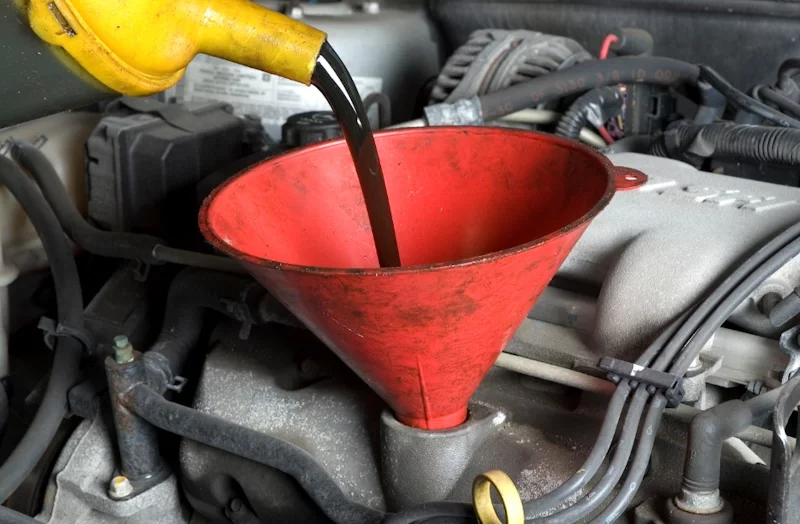Regular car oil change Naperville is cornerstone of car maintenance. Despite this, many drivers overlook car oil change Naperville until they encounter problems.
We delve into the reasons why consistent oil changes are crucial for your vehicle's health and performance.
Factors Affecting Oil Change Frequency
While mileage is a common indicator for oil change intervals, several other factors influence when your car needs car oil change Naperville. These include the type of oil used, the vehicle's age, and driving conditions.
Synthetic oils generally last longer than conventional oils, providing better protection and performance.
The age and condition of your vehicle also play a role if you need car oil change Naperville. Older cars might require more frequent oil changes due to wear and internal deposits. Harsh driving environments, such as frequent stop-and-go traffic or towing heavy loads, accelerate oil degradation. Extreme temperatures and dusty or dirty conditions can also impact oil life, necessitating more frequent changes.
Signs of Oil Problems
Several warning signs indicate that your car's oil is in poor condition or that there might be a more serious issue that requires car oil change Naperville. Paying attention to these signals can prevent costly engine repairs. Being proactive about car oil change Naperville and monitoring for these signs can save you from extensive damage and expensive fixes.
1.Check Engine or Oil Change Light
Your car's dashboard is equipped with warning lights designed to alert you to potential problems. The oil change light is straightforward, indicating low oil levels. However, the check engine light can signify a broader range of issues, including oil-related problems. Ignoring these lights can lead to severe engine damage, so it’s crucial to address them promptly with professional car oil change Naperville.
You can call us at (630) 904-4115 or use our online tool to book a time that works for you.
2. Unusual Engine Noise
Engine noise is a sensitive indicator of oil health. Healthy oil muffles engine sounds. If you notice increased noise, such as ticking, knocking, or rattling, it might signal oil breakdown or insufficient lubrication. These sounds can indicate that engine components are not properly lubricated, leading to increased friction and wear. Ask us about car oil change Naperville if you haven’t done any oil changes recently.
3. Dark Oil
New engine oil is typically clear or amber-colored. This clean appearance indicates that the oil is fresh and ready to perform its essential functions within the engine. Over time, however, engine oil begins to accumulate contaminants such as dirt, metal particles, and combustion byproducts. These contaminants cause the oil to darken, changing its color from clear or amber to a darker, opaque hue. If you are unsure, simply ask us about car oil change Naperville.
Regularly checking your oil is crucial for monitoring its condition. By using the dipstick, you can quickly assess the oil's color and consistency. If the oil appears dark and opaque, it's a clear sign that it has degraded and is no longer performing optimally. Dark oil indicates that it has lost its ability to clean and lubricate the engine effectively.
The oil's darkening suggests that it has been subjected to high temperatures and has mixed with combustion gases, causing oxidation and thickening. This compromised oil can no longer efficiently reduce friction between moving parts, which can lead to increased wear and tear on the engine components. Additionally, dirty oil is less effective at dispersing heat, which can cause the engine to overheat, further exacerbating wear and potential damage.
Dark oil also loses its ability to clean the engine by suspending harmful particles and preventing them from settling on engine parts. When the oil can no longer hold these contaminants, they can accumulate on vital engine components, leading to sludge buildup and restricted oil flow. This sludge can clog passages and reduce the oil's ability to reach all areas of the engine, resulting in inadequate lubrication and cooling.
Regularly checking and changing dark, dirty oil is vital for maintaining engine health. By doing so, you ensure that your engine remains properly lubricated and protected, extending its lifespan and maintaining its performance. Prioritizing oil changes based on the oil's condition, rather than just mileage, helps prevent costly repairs and keeps your vehicle running smoothly.
4. Suspicious Oil Smell
Detecting an oil smell within your car is a strong indication of a leak. This issue requires immediate attention as it can lead to more significant problems if left unchecked. An oil leak can cause engine damage and pose a fire hazard, so it’s vital to address it promptly.
5. Exhaust Smoke
While a small amount of vapor from the exhaust is normal, excessive smoke, especially blue or white smoke, suggests engine trouble. Blue smoke often indicates burning oil, while white smoke might signal coolant burning. These issues can be symptoms of significant engine problems, requiring immediate inspection and repair. Be sure to ask us about car oil change Naperville if you see exhaust smoke in your vehicle.
6. Decreased Fuel Efficiency
Engine oil directly impacts fuel efficiency. When oil is dirty or insufficient, your car's engine works harder, consuming more fuel. Noticeably lower fuel economy might be a sign of oil-related issues. Keeping your oil clean and at the proper level helps maintain optimal fuel efficiency.
7. Engine Overheating
Oil helps regulate engine temperature. If your car overheats frequently, it could be due to insufficient or degraded oil. Overheating can cause severe engine damage. Regular oil changes ensure that your engine remains properly cooled and lubricated, preventing overheating and extending the life of your engine.
Preventive Measures
To prolong your car's life and optimize performance, adhere to the following guidelines:
🚗Regular Oil Changes
Follow your car's owner's manual for recommended oil change intervals. If you drive in harsh conditions, more frequent changes might be necessary. Consistent oil changes keep your engine running smoothly and efficiently.
🚗Quality Oil
Use oil that meets or exceeds your car's manufacturer specifications. High-quality oil provides better protection and performance, extending the life of your engine.
🚗Oil Filters
Replace the oil filter with each oil change. A clean filter ensures that your oil remains free of contaminants, protecting your engine from wear and damage.
🚗Dipstick Checks
Regularly check your oil level using the dipstick. Monitoring your oil level helps you catch potential issues early, preventing damage and costly repairs.
🚗Professional Inspections
Schedule regular vehicle inspections to identify potential problems early on. Professional mechanics can detect issues that you might miss, ensuring that your car remains in good condition.
By prioritizing regular oil changes and being mindful of the signs of oil-related issues, you can significantly extend your car's lifespan and avoid costly repairs. Regular maintenance keeps your vehicle running efficiently, saving you money on fuel and repairs. Proper care of your car’s oil system ensures that your engine remains in good condition, providing reliable and safe transportation.
Call us today at Sparks Complete Car Care in Naperville and we will answer your questions about oil changes promptly.










